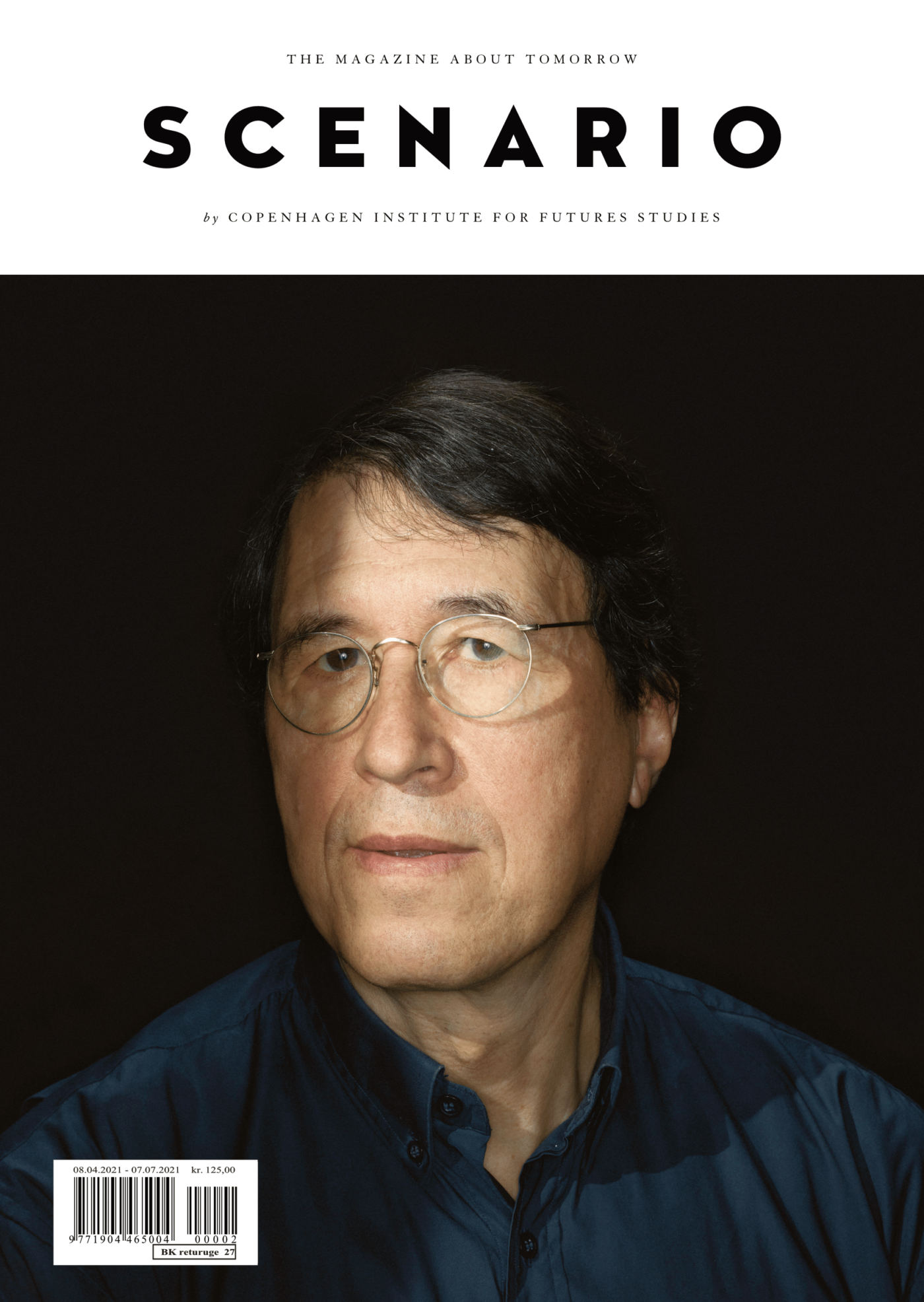
In turn, we use cookies to measure and obtain statistical data about the navigation of the users. You can configure and accept the use of the cookies, and modify your consent options, at any time.

Decolonising Futures
An interview with pioneering futurists Geci Karuri-Sebina and Kwamou Eva Feukeu
on the development of Africa’s future
A Scenario Archives feature
Africa is set to outpace other regions in the world in several parameters: the continent is home to seven out of ten of the fastest-growing economies and the world’s youngest population and will have 10 megacities with in total more than 150 million residents by 2050. But what does the anticipated development and growth mean to the people actually living in Africa? Geci Karuri-Sebina, with roots in Kenya and living in Johannesburg, works on anticipation in relation to people, place, and socio-technological change, and Kwamou Eva Feukeu, native to Cameroon, residing in Hamburg, works on decolonial law and futures – especially in Africa. Their paths crossed almost 10 years ago at the UNESCO conference ‘Decolonising African Futures’ which brought them on a common journey to futures thinking. We met the two pioneering futurists for a conversation on inside-out perspectives on the continent’s future.
What are your perspectives on the development of Africa’s future?
Geci: The astounding figures for internet access and mobile penetration tend to be a surprise factor because it’s generally thought to be a Northern phenomenon. It’s like ‘Oh my goodness, things are happening in Africa?’ Well yes, of course – there are many people here, and they are young and innovative. Also, I think the fascination with half of the world’s growth coming from Africa over the next decades tends to be associated with “this big new market”, which is exciting for people trying to sell things. But I’m not sure the reasons for the interest are as interesting as the actual developments and the potential they hold.
Eva: There’s this idea that Africa needs to follow Western modernity to be heard, but this assumption is the perfect example of the unsuccessful application of an IKEA manual on philosophical, socio-political, and economic wellbeing. When your future is described as someone else’s present or past, you have failed to thrive for yourselves. Or more precisely, you have been failed. Using economic or demographic indicators to detect or explain the reasons why and how African peoples can develop in the future is as amusing as it is misleading. It is also informative of what not to do when describing realities or deciding on trends: can we be less normative? Do we allow ourselves to be amazed by change of any kind? Who is part of the description? This openness would allow us to pay closer attention to activities on the ground that we do not talk about, such as mixed origins, agricultural techniques that address spirituality, ecology, and endogenous knowledge.
Geci: What concerns me is that we have governance frameworks that act in ignorance of these big trends, which are very different from what is happening in the north with its population decline and aging. We’ve got a youthful and highly mobile population. People talk about migration as though it is an issue of black bodies on red boats heading north, whereas in fact migration within the continent is much higher. There is a reality of demographic change, but what excites me is the future of the diaspora of African people all over the world. It has mattered for China, and for Europe, and I think it will matter for Africa’s future in terms of advancing knowledge, cultural flows and connectivity to new levels.
How do you see futures studies evolving as a field and as a practice?
Eva: What’s really interesting is this understanding that Futures Studies goes beyond scientific theory. A part of the World Futures Studies Federation is currently debating why Futures Studies is not as dominant as they could be. One reason is that we don’t have as many doctoral programmes, and another is that we don’t have enough strong scientific theories. I share those concerns, but I find it interesting that we have spent a lot of time justifying how some ways of using the future are more prestigious than others, without questioning why we are using the future in the first place. How come the discipline itself has never challenged the reproduction of current systems? It’s a subconscious continuation of the past, and my question is whether putting more scientific theory around it is going to help us achieve what we actually want?
So how can we make sense of the future in new ways?
Eva: There’s a humility check that is required from us in futures and foresight. I’ll give you an example: I worked with a group of bankers who were all set to explore possible, probable or preferable futures – as long as we did not question growth. The point is that traditional foresight may suffer from not questioning those tension points, and the fact that we can reveal their existence is a good entry point for this much needed conversation. It’s not always easy to do, because the reason why we are in demand is to provide solutions or answers, whereas as I see it futurists need to be midwives, enabling others to birth their own visions. We act as translators between worlds, to use the decolonial feminist Maria Lugones’s definition. That’s also why I’m so keen to see how people engage with futures literacy, because they see how they can use it in their own disciplines. Futures practitioners would gain from thinking about themselves not as method appliers, but as capability developers.
How is Africa an invitation to start seeing futures differently?
Eva: Futures work done in places where oppression is so obvious is useful for other places, too. I remember a beautiful question that emerged from a Futures Literacy Lab on the Future of Black America: ‘Is the American dream large enough for black imaginaries?’ The question exceeds a position between black or white imaginaries. It is the realisation that what is there remains insufficient. It is an invitation to try to see something that is not there, or not enough. Not only from the material side, but also the representational one. From a linguistic perspective, there are simply not enough words or images around me to capture what I mean or feel.
Geci: I think we ought to acknowledge the future and be concerned about it, and more importantly, we should be acting today in ways that are cognizant of it. Here, futures literacy as an approach invites us to be more aware of how and why we anticipate. There are some dominant contemporary systems and assumptions for how we think about the future that are subconsciously vested in certain knowledge systems and assumptions which really converge around a very small core of interests, right? Africa is then a great, open invitation to challenge these dominant and very limiting images and ideas of the future. Where better to start than in a place that has been systematically suppressed, excluded, and ignored?
Eva: Africa is a complex set of pluriversal spaces. It forms a lens, rather than a geographic destination, that invites humanity to converse in new and humbler ways. I think futures literacy in Africa captures interesting turning points for some of those conversations that are necessary for the evolution of humanity.
To what extent is Western versus African foresight practised differently?
Geci: As methods and tools formally applied, there’s no particular difference. But as soon as you begin to acknowledge that there are different ways to anticipate the future in different cultures, languages, places, and times, you open up a very interesting conversation. We are only just starting to scratch the surface, and I think that how and why people using the future could help bridge the chasm between the two selves that many black people have: your formal self when you’re at work, versus your “home” or real self with a different way of feeling and of being in your body. The more comfortable we are in our skin, the more we will have to contribute.
How do you see the impact of rising Afrofuturism as a genre?
Eva: Afrofuturism was an early opportunity for African American writers to describe the absurdity of their condition: “I am invisible because they refuse to see me” as Ralph Ellison write in Invisible Man from 1952. We find the message again in the movie Get Out from 2017. Afrofuturism has helped to reveal that if technology is a relationship to the world, so is race. From then on, we can initiate a dialogue within the community and outside it. Afrofuturism is an opportunity, it has potential and like anything else, it depends on what we do with it. It allows us to feel more comfortable experimenting. But ‘Who’s funding it?’ and ‘For what purpose?’ are two questions we cannot ignore. Although Afrofuturism started in Black America, it was reappropriated by other Blacks, including Africans. An Afrofuturist artist to be mentioned is the famous Kenyan filmmaker Wanuri Kahiu, who is very influenced by (Western) sci-fi, together with Afrofuturist musicians like Sun Ra. Afrofuturism holds a strong tech tropism, a mix of spirituality, but it also nurtures hope.
Geci: Take for instance Wakanda (the fictional country home of the superhero Black Panther). I believe it is important to work with the alterity, hope, and excitement that it inspires. In fact, it’s an invitation to innovation that doesn’t only have to be about technology, but also a conversation about modernity with tradition, empowerment with responsibility, community with colourful diversity. So I use Afrofuturistic references because they open up possibilities and put smiles on faces. But ultimately imagination is imagination. What we do and what others do is also important. I hope we will in time see less separation between our creatives and our ‘doers’.
How do you work to disseminate futures thinking across the continent?
Geci: I am a co-founder of the Southern African Node of the Millennium Project, aiming to connect African foresight practitioners and enthusiasts through a platform called ‘ForesightForDevelopment.org’. It promotes the sharing and use of foresight on and around Africa, acting as an aggregator to give futurists and stakeholders a way to find foresight resources on Africa. I also participate in other diverse platforms, from UNESCO’s global Futures Literacy Network to the Emergence Network. Also, I’m a global faculty member of Singularity University, a more corporate leadership-type space where the foresight tends to be more technocentric and solutionist.
Eva: I am pursuing my legal background in the futures field with regard to decolonising the law, and what that means on the African continent. How come we are still using rules and norms that were made in other spaces in the world? Can’t we be norm producers ourselves? Yes, of course we can! Those questions are at the core of decolonial studies and complexity theory in general. That’s why I became interested in futures in the first place. The work I do around UNESCO comes with a mandate from our 193 member states and the privilege to support initiatives that don’t have sufficient funding, so we can take on projects that engage important questions around implementing Futures Literacy, for example in Syrian homes or the future of Martinique (a French Caribbean island, ed.). For instance, if someone reading this magazine wishes to become a local champion and launch a project, I can support such an aspiration as part of my organisation’s mandate.
You work together on the Capacity to Decolonise (C2D) programme. What is that about?
Geci: C2D is a multi-year project in Africa that introduces futures literacy as a capability-based approach to decolonising futures – to free us for example from the prevailing but senseless paradigm of growth for growth’s sake. “Resurgence” is a term from decolonial theory which is about redefining who you are and what your community is about; we use this to explore how futures literacy can be used as an entry point for emancipatory processes to happen.
… and how can futures literacy enable that?
Eva: It is about rethinking in a more participatory manner to make sure that futures are not just created by a few, and about enlarging the community of people setting the agenda and owning it. Secondly, it’s about bridging the gap between proposed new imaginaries and the actions that follow. What does freedom mean? What does it mean to act upon such a belief? What are the applications that people can opt for once they’ve articulated those ideas?
Geci: So, if there is no big development ‘destination’ that we should all be working towards – what do you do once you realize that? What are you inviting people to do once you say that the destination is not clear anymore? It’s a post-activist idea that invites people to explore new practices and new knowledge and other ways of thinking, doing and being.
How would you like to see the impact of your work?
Eva: I want to keep enabling and inviting more people to feel they can own the norms that they apply, and make sure that there is a connection between what people have in their heads and the way they think about the future.
Geci: At one stage I felt my mission was to popularise futures thinking, but looking back I don’t think that was particularly humble. So now my humbler goal is about inviting people on that journey and investing my time to foster the idea of ‘decolonising the future’ as a practicable and inclusive inquiry.
How would you advise your future selves?
Geci: I recently discovered that my superpower is asking questions. I think that’s a beautiful thing, and I’d advise myself to hang on to that as a strong call to humility. And secondly, I wish to open up inquiries rather than closing down spaces.
Eva: I really believe in the humility check too, and that the only thing that is sustainable is hope. Our job as futurists is to make sure we never let it go once we have it. So my advice to future Eva is to make sure that those ideas, concepts, or words used in the general discourse around how to make Africa, or any community, better don’t lose their meaning.

This is an article from Issue 60 of Scenario Magazine.